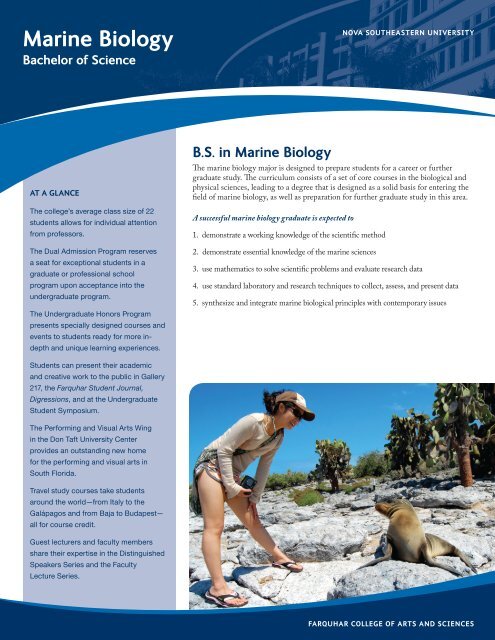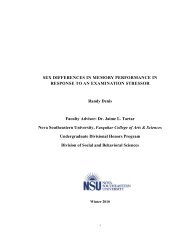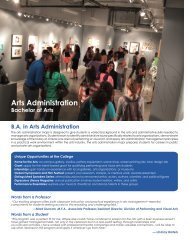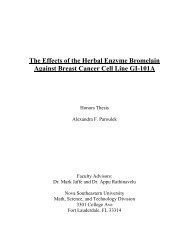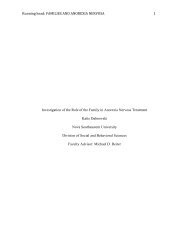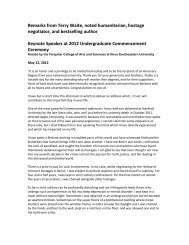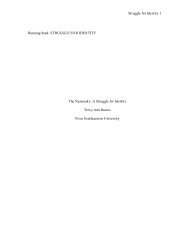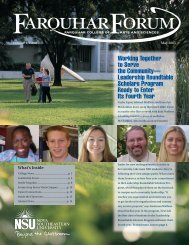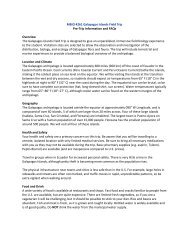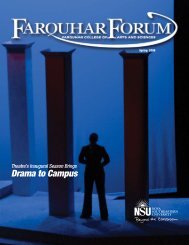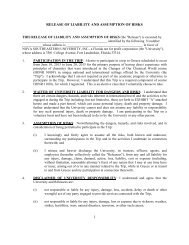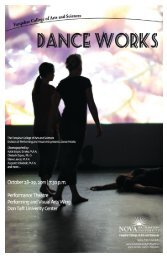Marine Biology - College of Arts and Sciences - Nova Southeastern ...
Marine Biology - College of Arts and Sciences - Nova Southeastern ...
Marine Biology - College of Arts and Sciences - Nova Southeastern ...
- No tags were found...
You also want an ePaper? Increase the reach of your titles
YUMPU automatically turns print PDFs into web optimized ePapers that Google loves.
<strong>Marine</strong> <strong>Biology</strong><br />
Bachelor <strong>of</strong> Science<br />
NOVA SOUTHEASTERN UNIVERSITY<br />
AT A GLANCE<br />
The college’s average class size <strong>of</strong> 22<br />
students allows for individual attention<br />
from pr<strong>of</strong>essors.<br />
The Dual Admission Program reserves<br />
a seat for exceptional students in a<br />
graduate or pr<strong>of</strong>essional school<br />
program upon acceptance into the<br />
undergraduate program.<br />
The Undergraduate Honors Program<br />
presents specially designed courses <strong>and</strong><br />
events to students ready for more indepth<br />
<strong>and</strong> unique learning experiences.<br />
B.S. in <strong>Marine</strong> <strong>Biology</strong><br />
The marine biology major is designed to prepare students for a career or further<br />
graduate study. The curriculum consists <strong>of</strong> a set <strong>of</strong> core courses in the biological <strong>and</strong><br />
physical sciences, leading to a degree that is designed as a solid basis for entering the<br />
field <strong>of</strong> marine biology, as well as preparation for further graduate study in this area.<br />
A successful marine biology graduate is expected to<br />
1. demonstrate a working knowledge <strong>of</strong> the scientific method<br />
2. demonstrate essential knowledge <strong>of</strong> the marine sciences<br />
3. use mathematics to solve scientific problems <strong>and</strong> evaluate research data<br />
4. use st<strong>and</strong>ard laboratory <strong>and</strong> research techniques to collect, assess, <strong>and</strong> present data<br />
5. synthesize <strong>and</strong> integrate marine biological principles with contemporary issues<br />
Students can present their academic<br />
<strong>and</strong> creative work to the public in Gallery<br />
217, the Farquhar Student Journal,<br />
Digressions, <strong>and</strong> at the Undergraduate<br />
Student Symposium.<br />
The Performing <strong>and</strong> Visual <strong>Arts</strong> Wing<br />
in the Don Taft University Center<br />
provides an outst<strong>and</strong>ing new home<br />
for the performing <strong>and</strong> visual arts in<br />
South Florida.<br />
Travel study courses take students<br />
around the world—from Italy to the<br />
Galápagos <strong>and</strong> from Baja to Budapest—<br />
all for course credit.<br />
Guest lecturers <strong>and</strong> faculty members<br />
share their expertise in the Distinguished<br />
Speakers Series <strong>and</strong> the Faculty<br />
Lecture Series.<br />
FARQUHAR COLLEGE OF ARTS AND SCIENCES
<strong>Marine</strong> <strong>Biology</strong><br />
Bachelor <strong>of</strong> Science<br />
2011–2012 Curriculum<br />
Students are required to complete 30 credit hours as part <strong>of</strong> the<br />
General Education Program.<br />
<strong>Marine</strong> <strong>Biology</strong> Major Requirements (56–61 credits)<br />
Core Courses (37 credits)<br />
BIOL 3200 General Ecology/Lab (4 credits)<br />
BIOL 3300 Invertebrate Zoology/Lab (4 credits)<br />
BIOL 3600 Genetics/Lab (4 credits)<br />
CHEM 1300 General Chemistry I/Lab (4 credits)<br />
CHEM 1310 General Chemistry II/Lab (4 credits)<br />
MBIO 1050 Introductory <strong>Marine</strong> <strong>Biology</strong> Seminar (1 credit)<br />
MBIO 2410 <strong>Marine</strong> <strong>Biology</strong>/Lab (4 credits)<br />
MBIO 2500 Oceanography/Lab (4 credits)<br />
PHYS 2350 General Physics I/Lab (4 credits)<br />
PHYS 2360 General Physics II/Lab (4 credits)<br />
Group III: Lab or Field Based (6–8 credits)<br />
Select 6–8 credits from the following courses:<br />
BIOL 2950 Field Study at John U. Lloyd Beach State Park<br />
(3 credits)<br />
ENVS 3170 Everglades Ecology <strong>and</strong> Conservation (3 credits)<br />
MBIO 2100 Coastal <strong>Biology</strong> <strong>of</strong> Southeast Florida (4 credits)<br />
MBIO 3450 Survey <strong>of</strong> <strong>Marine</strong> Mammals (3 credits)<br />
MBIO 4260 Ecology <strong>of</strong> the Galapagos Isl<strong>and</strong>s (3 credits)<br />
AND<br />
MBIO 4261 Ecology <strong>of</strong> the Galapagos Isl<strong>and</strong>s Field Trip<br />
(1 credit)<br />
MBIO 4350 The <strong>Biology</strong> <strong>and</strong> Ecology <strong>of</strong> the Manatee<br />
(3 credits)<br />
MBIO 4910 Advanced <strong>Marine</strong> <strong>Biology</strong> Field Topics<br />
(1–3 credits)<br />
SCIE 4990 Independent Study in Science (1–12 credits)<br />
Major Grouped Electives (19–25 credits)<br />
Group I: Classroom Based (6–8 credits)<br />
Select 6–8 credits from the following courses:<br />
BIOL 2250 The Natural History <strong>of</strong> John U. Lloyd Beach<br />
State Park (3 credits)<br />
BIOL 3320 Anatomy <strong>and</strong> Physiology I/Lab (4 credits)<br />
BIOL 3330 Anatomy <strong>and</strong> Physiology II/Lab (4 credits)<br />
BIOL 3400 Microbiology/Lab (4 credits)<br />
BIOL 3800 Evolution (3 credits)<br />
BIOL 4340 Cellular <strong>and</strong> Molecular <strong>Biology</strong> (3 credits)<br />
CHEM 2200 Essentials <strong>of</strong> Organic Chemistry (4 credits)<br />
CHEM 3650 Biochemistry/Lab (4 credits)<br />
MBIO 3910 Sharks <strong>and</strong> Their Relatives (3 credits)<br />
SCIE 3210 History <strong>of</strong> Science (3 credits)<br />
Any TECH/CSIS course (3 credits)<br />
Group II: Required Field Component (7–9 credits)<br />
Select 7–9 credits from the following courses:<br />
BIOL 3311 Vertebrate Zoology/Lab (4 credits)<br />
MBIO 3700 <strong>Biology</strong> <strong>of</strong> Fishes/Lab (4 credits)<br />
MBIO 3750 Coral Reefs <strong>and</strong> Coral Communities (3 credits)<br />
MBIO 4900 Special Topics in <strong>Marine</strong> <strong>Biology</strong> (1–3 credits)<br />
SCIE 4490 Research Methods (3 credits)<br />
This publication should not be viewed as a substitution for <strong>of</strong>ficial<br />
program requirements <strong>and</strong> outcomes. Students are responsible for<br />
meeting curriculum <strong>and</strong> program requirements in the Undergraduate<br />
Student Catalog in effect when the student enters the program.<br />
<strong>Nova</strong> <strong>Southeastern</strong> University is accredited by the Commission on <strong>College</strong>s <strong>of</strong> the Southern Association <strong>of</strong> <strong>College</strong>s <strong>and</strong> Schools (1866 Southern<br />
Lane, Decatur, Georgia 30033-4097, Telephone number: 404-679-4501) to award associate’s, bachelor’s, master’s, educational specialist,<br />
<strong>and</strong> doctoral degrees. n <strong>Nova</strong> <strong>Southeastern</strong> University admits students <strong>of</strong> any race, color, sexual orientation, <strong>and</strong> national or ethnic origin.<br />
Admissions<br />
3301 <strong>College</strong> Avenue<br />
Fort Lauderdale, Florida 33314-7796<br />
www.nova.edu/admissions<br />
(954) 262-8000 • 800-338-4723<br />
admissions@nsu.nova.edu<br />
Division <strong>of</strong> Math, Science, <strong>and</strong> Technology<br />
www.fcas.nova.edu/divisions/mst<br />
(954) 262-8301 • 800-757-7257<br />
09-043x-11NOM


